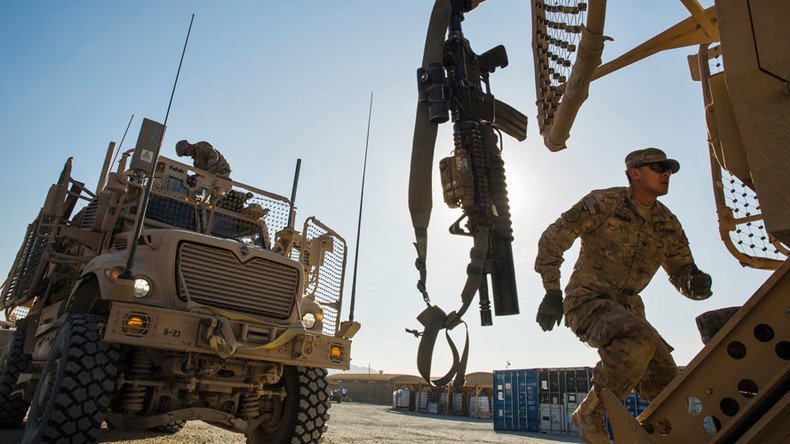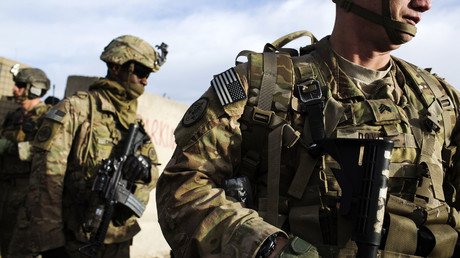Exposed: 'US Special Forces in Afghanistan killed pregnant women, removed bullets'

US killings of civilians near Gardez, Afghanistan is an extraordinary case of a cover-up which goes far beyond what happened with the bombing of the MSF hospital, says Gareth Porter, an investigative journalist on US national security policy.
The Pentagon has released the findings of an investigation into a night raid in Afghanistan that led to the deaths of several civilians.
The report concluded that US soldiers used an appropriate level of force, although that finding is wrought with doubt.
Documents, revealing details of the raid in Afghanistan, were obtained and published by The Intercept website.
RT: You are familiar with the documents relating to the raid. Could you tell us more about their content and whether they support the Pentagon's conclusions?
Gareth Porter: I was in fact requesting exactly the same documents and got them at the same time as the Intercept got them. These are, at least what is available from the US military about the investigation that was ordered by General Stanley McChrystal, who was then in charge of US troops in Afghanistan, to try to save the reputation of the Special Operations forces in Afghanistan which were under extreme fire because the story had come out about the killings in Gardez by the Special Forces, including the murder of three women, two of them were pregnant, and of the cover-up of the killings by the Special Forces in their report to the US military command.
So, understand here that McChrystal himself is a product of Special Operations forces. He came out of that culture, and in fact had given privilege to the use of these night raids of which this was a primary example in Afghanistan in his strategy as commander of US forces. So, he had an opportunity here to find the truth, but he used it to cover up what had already been covered up by the Special Forces themselves in their report to the command.
RT: Apparently, the US Army had information that there were terrorists in the compound. Does that justify their actions?
GP: Somebody did in fact report that suspected Taliban were in the compound, but that information was completely wrong, as was so much of the information that the Special Operation forces used for their targeting of the night raids in Afghanistan. And in fact the individual who was the target of that raid, the person who they were searching for when they went in guns blazing to that compound, turned himself in a few days later and was questioned and ultimately released. He was the wrong man. So, once again, the intelligence was wrong, the killing was in vain and they covered it up in order to try to save their own skins.
In fact, the eye witnesses to the raid and to the killings saw the US Special Forces digging the bullets out of the bodies of the pregnant women. And those family members were never interviewed by the person who carried out the so-called investigation.
Jason Ditz, news editor from Antiwar.Com. commented on the issue: "This was not an isolated incident. There have been a lot of cases particularly around this time of soldiers wildly abusing their power and particularly in night raids such as this, killing large number of civilians and never being brought to account for it."
RT: After the US attacked a hospital in Kunduz Washington apologized, whereas in the 2010 case they said "appropriate" force was used. What is the difference between the two cases?
GP: That is a very good question and I think the answer is very clear that in 2010, the investigation was carried out under the auspices of General McChrystal, who was a very powerful figure in the US military. And it was done again by someone who was under his command not at the time that the investigation was carried out, but later, after the investigation; this person was someone who knew he was going to be under McChrystal's command. So, it was fixed, it was cooked up ahead of time. That is an extraordinary case of a cover-up, which goes far beyond what we saw even in the case of the bombing of the MSF hospital.
Jason Ditz, news editor from Antiwar.Com. told RT: "In the case of the hospital in Kunduz there was a lot more publicity because Doctors Without Borders is a big enough organization to be able to make a big deal about it. This report claiming the appropriate level of force used in the previous incident was basically a secret report, and it is only because the Intercept went through all of the hoops of the Freedom of Information Act… Going to the Pentagon for freedom of information requests is not an easy thing to do… It takes a long time to get documents from the Pentagon."
RT: The results of the investigation have been made public six years after the incident. Why did it take so long?
GP: I can’t account for the exact timing of this, but clearly there was a lot of shuffling around and trying to put off coming up with any documentation in response to the request by the Intercept, by other journalists and by myself. And I can tell you that a source who was in a position to know about this has in fact told me that the people responsible in Special Operations forces ultimately were eased out or quietly pushed out of the military, even though the public position that has been taken is that they were not subject to any disciplinary actions. Unofficially, they were. In other words, they knew perfectly well that they committed this crime and covered it up. But for PR purposes, for political purposes, General McChrystal and his designated investigator covered it up and that has stood to this day. And in order to do that, by the way, they redacted 400 pages of the documentation, which obviously told too much of the truth to allow it to be given out to the public.
The statements, views and opinions expressed in this column are solely those of the author and do not necessarily represent those of RT.













